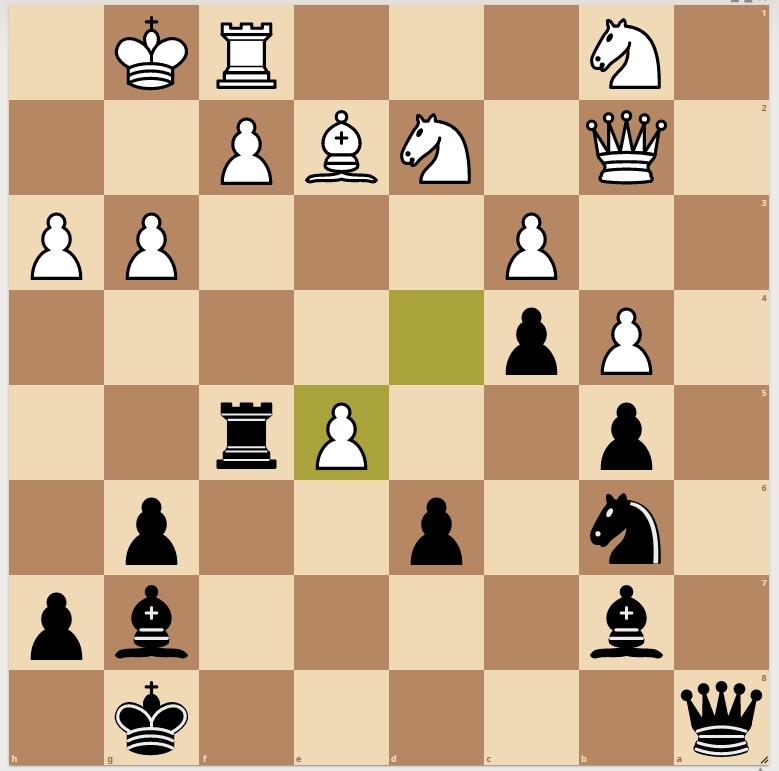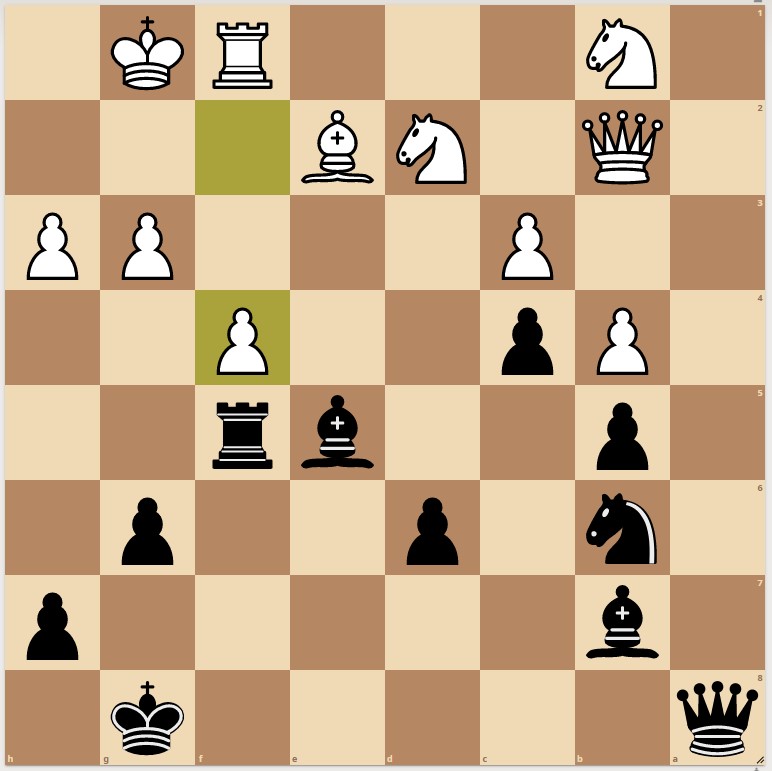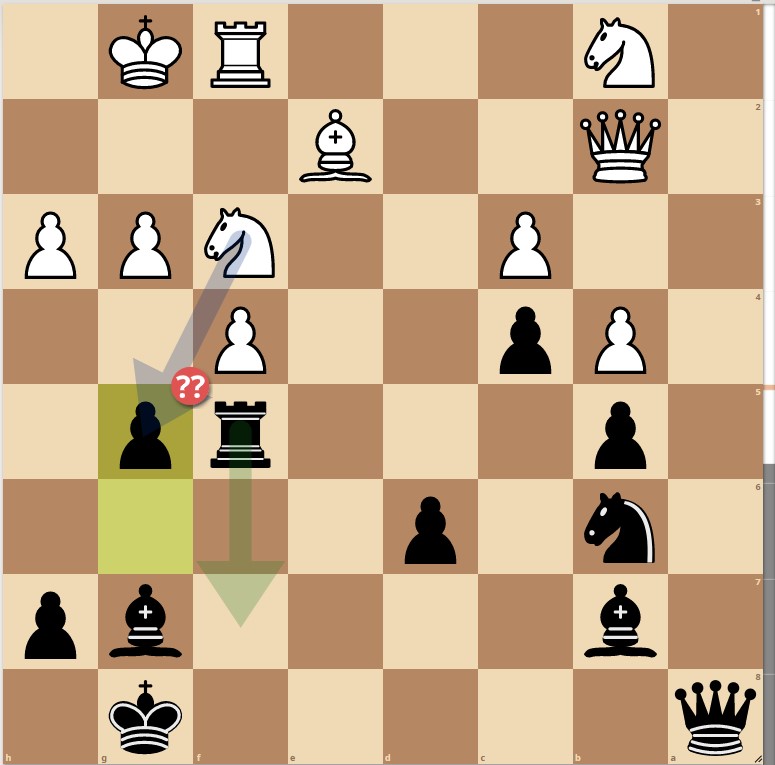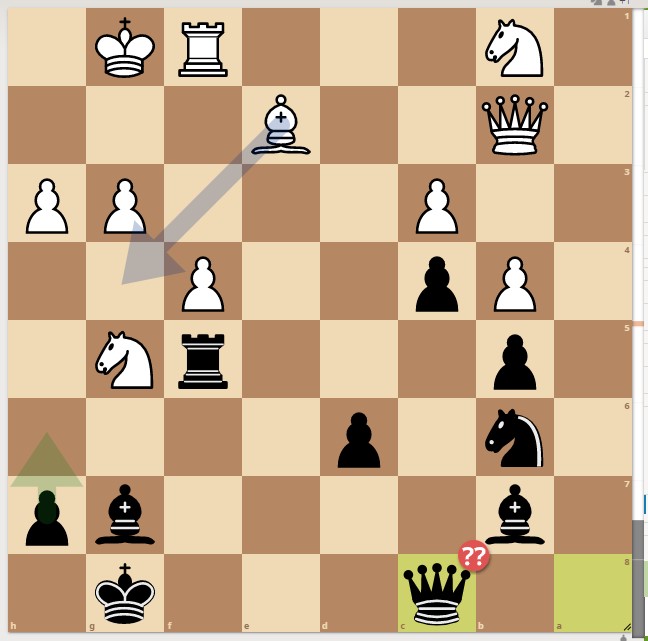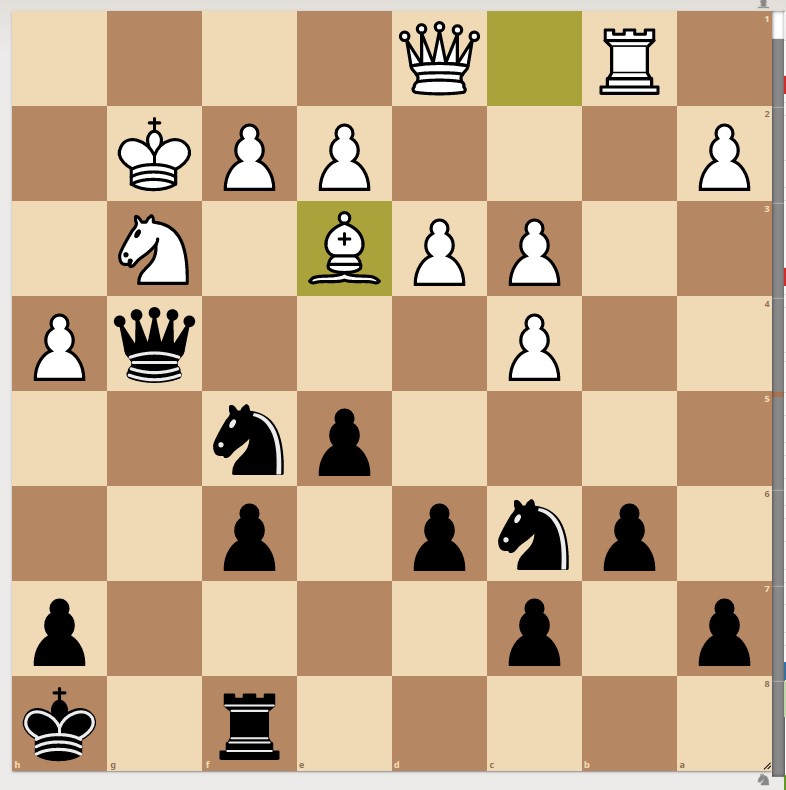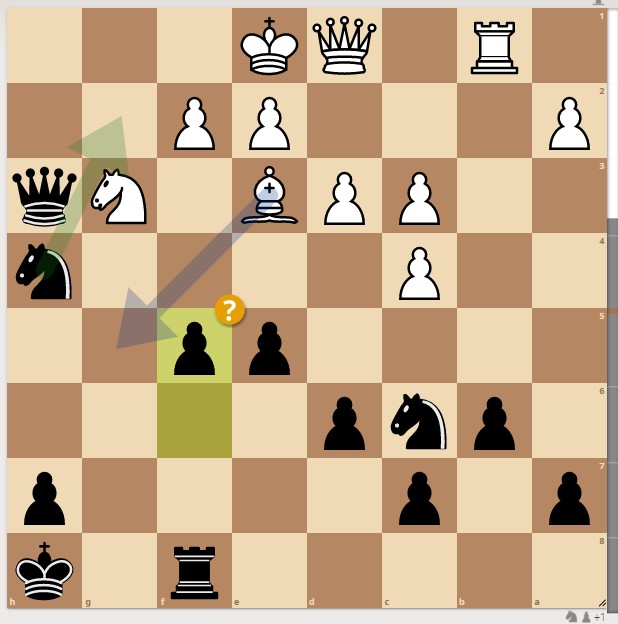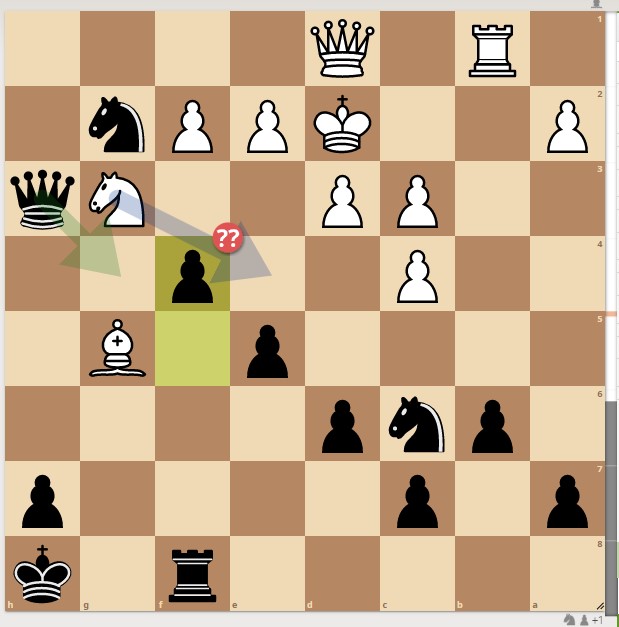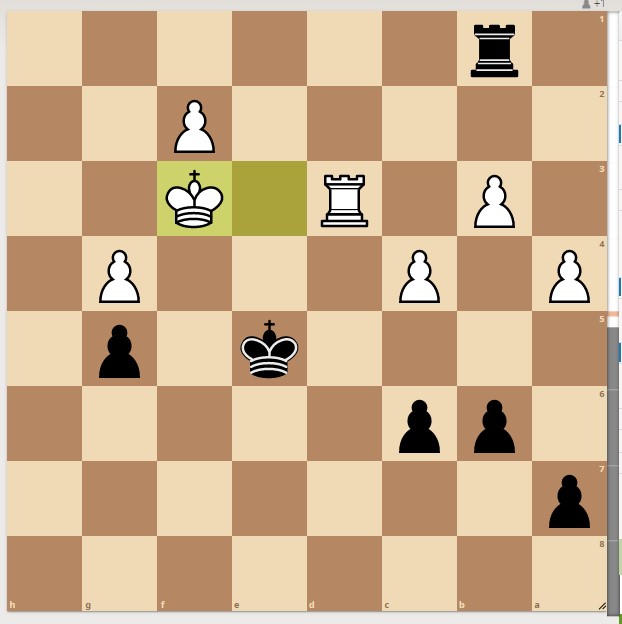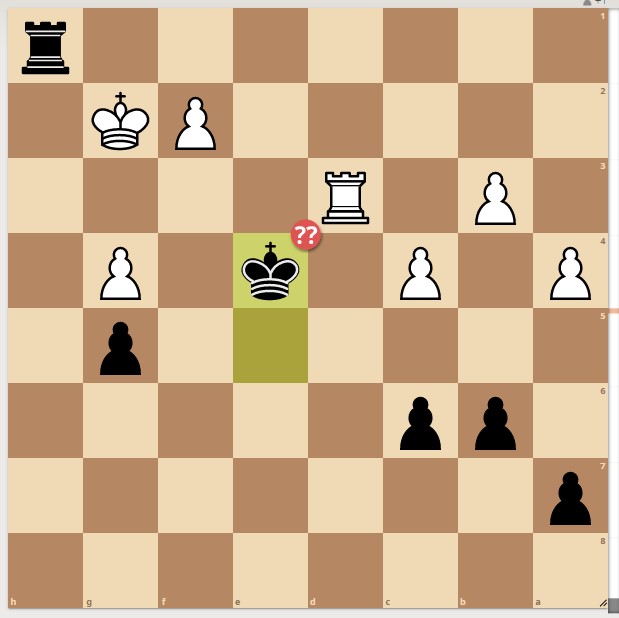Three examples with black against opponents 250-350 points higher.
I ‘ve started playing classical chess in September 2021 for the very first time in my life. I played 39 games in 15 months. Previously, I had been occasionally playing online only, and mostly blitz. I played a few classical games in the last 15 months. I’ve studied and done some progress within some time. My current ECF rating for November 2022 is 1549, but my live rating is 1556. My highest live rating was 1581, and my objective is to reach 1650 by summer 2023.
In the meantime, here are some mistakes I’ve done, mostly against better players, which I wouldn’t probably do, if someone presented to me those positions as puzzles.
The difference is that if you have a couple of hours of playing chess already thinking hard and deep, and if you have examined so many different strategies and tactics in that time, you do need some ease. This ease may come at very crucial moments, when the game requires your highest concentration, not the lowest! So, here is when experience plays a role. Trying to build this experience, here is a list of some blunders or mistakes, that proved critical and decisive for the result, and from which I am trying to learn not to repeat them.
Example one.
Game 39. Me with black (1569) vs white (1855), move 23. The engine says -5.1. I had a clearly winning position.
It would have been a triumph to beat a player 286 points higher than me. I had three choices on how to capture back the pawn on e5: dxe5, Bxe5 or Rxe5. What do you think? I will analyse after the diagram, so stop here if you wish to think.
As I said before, if I was presented with this puzzle, I would quite quickly choose Rxe5. Here is why:
Bg2 is a nice fork that was always in my mind for the previous 5 moves or so; it remains alive. I also attack the hanging rook and have good time to move my queen around (which I did do later anyway).
I chose the bishop (Bxe5) in order to activate another piece. This was not the end. Engine says -2.6, so still a winning position!
Then, my opponent played f4. Here is the missed win! Easy puzzle this one. I analyse after the diagram.
The a7-g1 diagonal opens up for my queen to have a discovered check. Note that the knight can win the queen. This is a very easy puzzle to solve, but in real conditions the hierarchy changes. When you are attacked, you first think how to save your pieces and then the rest. This is wrong sometimes! Qa7 would have been a very strong move (although the engine says that Nd5 is slightly stronger). But for me Qa7 would have done the trick, and I wouldn’t care about my bishop being taken, as this leads to a checkmate! Clearly a missed chance to a triumph here.
So, I receded the bishop (remember that this was the piece I tried to activate 2 moves earlier? no planning at all from my side). My opponent moved Nf3, where I am still winning (-3.1). But now, the sequence of 3 consecutive mistakes or blunders had its peak. For a completely unknown reason for me, I moved g5. I don’t even remember what I was thinking. Terrible blunder that turned the table. Now, the engine says +0.8. Still a bit balanced, but lost the advantage.
The following move was a disaster. He took Nxg5 (+1.2) and then I made the final blunder Qc8, which made it +4. Fourth consecutive very bad move. Lost the advantage, and lost the game a few moves later. What a missed chance, after all this build up of a winning position for 22 moves against a top player. More below!
Full match
Example two.
Game 36. Me with black (1545) vs white (1800), move 26. The engine says -8.9! Huge winning advantage for me. Analysis after the diagram.
I had the chance to add a third attacked on the g-file with Rg8. No chance for white to add a second defender, so the game could have been over in 2 moves. The minimum to be achieved is to win a piece! What did I do? I wanted just a pawn! Another lesson to learn: when you see a good move, look for a better one.
Look at this mess 2 moves later. Check with the knight and check with the queen. It reminded me a principle I was repeating over and over again to young kids when I was teaching chess along the line: “you are too happy when you check your opponent’s king, but sometimes this doesn’t lead to anything. Think more!”. (we can see this childish pattern in later examples).
After another check, I finally tried to push the pawn. The knight and bishop were in ideal position for a pawn-fork 4 moves earlier. I saw that, but didn’t have the courage to wait. Now, the engine says +1.7, so I lost some 10 points in 3-4 moves of continued checking. Beware the pattern!
Another missed win. Those two examples within just a few weeks time meant a -40 ECF points (20 points per game is the difference between winning and losing). I would already been above 1600 by now! But, let’s focus on chess and not on my rating.
Full match
Example three.
Game 26. Me with black (1571) vs white (1939), move 42. The engine says +0.2, despite the extrra pawn for my oppoinent. An equal ending against a player 368 points higher than me! Also note that my opponent had 10 seconds left here, and I had around 15 minutes!
I would have been very happy with the draw. I’ve come to this kind of situations many times in the past. I tend to play faster and have more time than my opponent. Of course, we have +10 seconds bonus after every move, so it’s not really a bullet, but people do play very fast when they are short of time. This passes on to me for no apparent reason: I tend to play as fast as them, not utilising my advantage. I am sure if I offered a draw here, he would accept. How would you proceed? Thoughts after the diagram.
The engine says I should push the a-pawn to a6. Good, quiet move, which would make my opponent to think. His rook is restricted. If it moves the 3rd rank I can take his pawn (this was my plan a few moves earlier). Plenty of opportunities to go to a draw. But the possibility of winning against such a good opponent blinded me. I moved my rook to Rh1 trying to pressure on the other side, and make him think a lot. He moved his king Kg2 attacking my rook. Then, I blundered! I was thinking that an exchange of rooks would make this winning for me, as my king would be in the centre, while his king would be at the corner. So, I would have the better position. Also, I had the time. Thinking about a rook exchange, and not using the plenty of time thinking, it was me who made the bullet-type blunder and moved my king to Ke4!
No! He didn’t take my rook with Kxh1, so that I could take Kxd3 (which by the way would still be advantegous for white, but I didn’t have the courage to calcualte after 3-hours of intensive thinking, but at the time I would have been happy due to his shortage of time). He did something much better, which you probably already got: He checked my king with rook: Re3+, and then got my rook. So, I resigned in a position that one move earlier was draw-ish and my opponent had only 10 seconds on the clock! A missed draw against a +368 opponent! By the way, this opponent today (5 months later) is already on 2010! So, our difference is 100 points greater than what it was back then!
Full match
The pity in this kind of situations is that all the effort to build a good winning position (or, at least, a draw position) against a player much better than yourself, is destroyed by lack of experience and one huge blunder.

